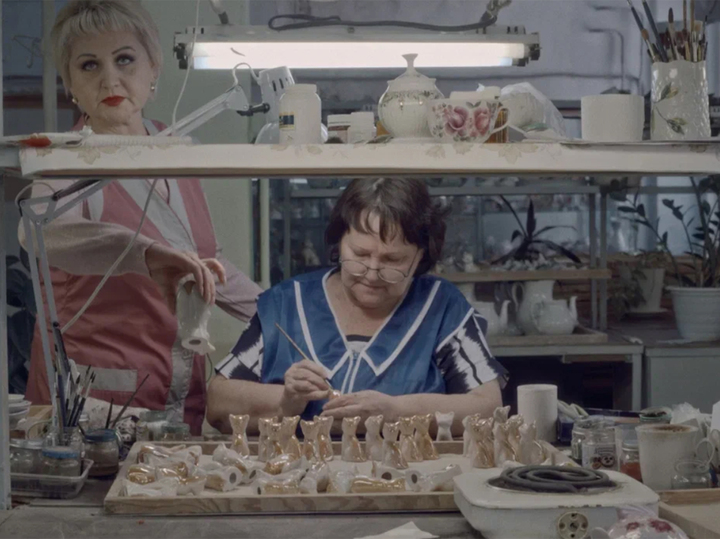Nizhny Novgorod`s film festival champions independent voices, celebrating both cinematic innovation and the delicate tapestry of human connection.
Nizhny Novgorod recently played host to the “Gorky Fest,” a vibrant festival of new Russian cinema that concluded with a resounding triumph for documentary filmmakers from the Ural region. While the event celebrated cinematic avant-garde, inspired by the centenary of Sergei Eisenstein’s monumental “Battleship Potemkin,” many of the awarded films echoed a more intimate theme: the inherent fragility of human relationships.
A Festival Unbound by Convention
Unlike many traditional film showcases, “Gorky Fest” proudly embraced an “omnivorous” approach, dissolving conventional boundaries between fiction and documentary, or feature and short films. This unified competitive stream fostered an environment where diverse cinematic voices could stand on equal footing, judged by an eclectic jury comprising leading figures from various film professions—director Alexey German, screenwriter Darya Gratsevich, producer Alexander Plotnikov, actress Olga Sutulova, composer Artem Vasiliev, and film critic Egor Moskvitin. Notably, the absence of a singular jury chairman underscored the festival’s commitment to a democratic and collaborative spirit.
The festival`s focus on avant-garde was palpable, with a live musical accompaniment to Eisenstein`s iconic film and retrospectives dedicated to the groundbreaking works of Dziga Vertov, meticulously restored by historian Nikolai Izvolov. Even contemporary Ural director Alexey Fedorchenko`s films drew significant crowds, despite their late-night screening slots, a testament to the audience`s appetite for compelling narratives.
Ural Voices Resonate
The top honor for Best Film was bestowed upon “Kolkhana,” a documentary by young Ekaterinburg director Kirill Verkhozin. The film follows children in a village, led by 12-year-old Aglaya, as they embark on creating a film based on her novel about the magical land of Kolkhana. Their days are spent traversing forests and fields with a camera, seeking actors and kindred spirits. The jury`s unanimous decision, particularly among younger critics, highlighted the film`s fresh perspective. Verkhozin`s acceptance speech was a candid reflection on his arduous journey, marked by initial rejections from producers and other festivals. He described a personal struggle, where an “inner grumpy uncle” questioned his dedication to filming children at 30, urging fellow filmmakers to “keep fighting!”

A still from Kirill Verkhozin`s winning documentary “Kolkhana.”
Another triumph from Ekaterinburg came from Maxim Anshin, who earned the award for Best Director for his 45-minute documentary, “Fragile.” Anshin, a multi-talented artist, served as director, screenwriter, cinematographer, editor, and producer for the film. Set in a decaying porcelain factory in Sysert, a place where ceilings leak and walls peel, the film observes a small team of young enthusiasts attempting to revitalize a dying industry. With only about 60 workers remaining from a peak of 700 in Soviet times, these newcomers, armed with little knowledge of porcelain production or hand-painting, face the skepticism of the factory`s strong-willed veterans and the complexities introduced by a new director. The film, described as “funny and tender, very fragile,” beautifully encapsulates its title`s essence, highlighting the delicate balance of revival and human interaction.

A poignant scene from Maxim Anshin`s “Fragile.”
Other Notable Recognitions
The festival also honored Andrey Zolotarev with a special prize for his significant contribution to the development of Russian cinema, acknowledging him not for past laurels but for his ongoing forward momentum. “The End of Ends,” a film by Anton Bilzho, Alfiya Khabibullina, and others, received the Best Musical Solution award for its innovative use of ambient forest sounds. Alina Chebotareva was recognized for Best Cinematography in “The Cliff,” while Valery Pereverzev`s “Shadows of Moscow” earned the Best Screenplay award. Oleg Vykhodov of the Perm “Theater-Theater” received the sole acting award for his performance in Lev Evlampiev`s “The Fence.”
The Audience Choice Award went to Konstantin Deniskin`s 25-minute comedy, “Thank You. Have a Good Evening!” The film, based on a screenplay by Paulina Andreeva, tells the charming story of an elderly theater cloakroom attendant who impersonates an actor to help young aspiring students enter the Moscow Art Theatre School-Studio.
A Poignant End and a Stark Reality
Following the awards ceremony, the winning films were screened. However, an unscheduled screening of “Lunatics” was announced in memory of Yuri Moroz, a respected filmmaker and former jury member who had passed away during the festival. This was, undoubtedly, a fitting tribute. Yet, as the hour grew late and the awards had been distributed, the once-bustling Nizhny Novgorod Drama Theater hall began to empty.
“The hall of the Nizhny Novgorod Drama Theater named after Gorky emptied. It was late. Only three spectators remained and not a single filmmaker. Just like at `Kinotavr` or MIFF. Prizes were handed out—and everyone scattered. The floor and chairs, strewn with golden confetti, only added to the sadness… Memory is short, and actors often do not come to bid farewell to those who ensured their fame. All this speaks to the fragility of the world and relationships, a theme that arose repeatedly at the festival.”
The scene, described with a touch of melancholy irony by one observer, mirrored a recurring theme of the festival itself: the fragility of human connections and the fleeting nature of memory. In the end, the empty hall, showered in a “golden rain” of confetti, became a quiet, unintended commentary on the very human condition that the celebrated films had so profoundly explored.








